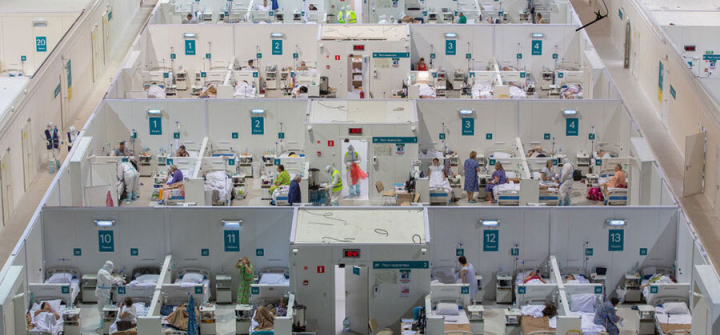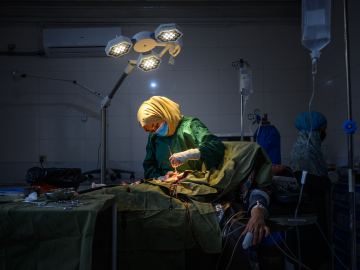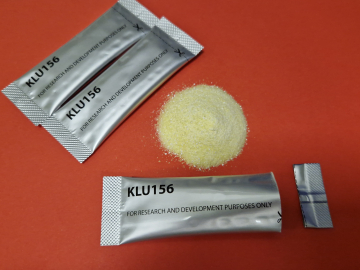‘Dangerously Unprepared’: New Report Faults Countries’ Pandemic Readiness… Again
A couple long years into the COVID-19 pandemic, it can be easy to think of it as a once-in-a-generation event. Instead, the pandemic should be viewed as “a warning shot” in the face of mounting biological threats that countries still aren’t prepared to meet, according to a global health security report released today.
The 2021 Global Health Security Index finds that despite all the steps taken in response to the pandemic, exactly 0 of 195 countries assessed have sufficient long-term health resources at the ready—leaving them vulnerable to future health emergencies.
“There has been an incredible amount of money put towards the COVID-19 response, and to see these kinds of findings is discouraging,” said Jessica Bell, the senior director of Global Biological Policy and Programs at Nuclear Threat Initiative, which released the Index with the Johns Hopkins Center for Health Security at the Bloomberg School of Public Health.
“I think the takeaway is that this kind of change we’re measuring takes quite a long time to accomplish. The decades of underfunding public health have real-life consequences.”
This second iteration of the Index picks up 2 years after the 2019 Index left off: the eve of the pandemic.The 2021 version arrived today with heightened interest, fresh urgency, and new insights derived from COVID-19 responses.
And once again, it arrives at alarming conclusions.
Even countries that rank high for preparedness—like top-ranking US— have failed dismally when it comes to actually responding to the pandemic.
“COVID-19 offers a devastating illustration of how poor pandemic preparedness and response can impact health and security at every level—local, national and global,” said NTI co-chair and CEO Ernest J. Moniz in a statement. “The stakes are high, and world leaders need to act. Biological risks are growing in frequency, and all countries need more investment in durable capabilities to address these risks.”
COVID-19 drove action — but not enough
The pandemic’s shadow loomed large over the creation of the 2021 GHS Index, complicating everything from data collection to meetings between international advisers—all who were involved in their countries’ pandemic responses
Still, the team was deeply motivated to update the Index, which is designed to hit the desks of those who steer public health and security decisions—leaders in government, health, finance, philanthropy and other areas.
The Index aims to spotlight gaps countries need to fill to prepare for future outbreaks and help them “know how best to use their very limited resources to meaningfully protect themselves,” said the Center for Health Security’s deputy director Anita Cicero, who described the index as “a guidepost.”
To do that, the Index is based on publicly available data, compiled by Economist Impact — a research and media service launched by The Economist—to assess capacities in 6 categories: prevention, detection, rapid response, the overall health system, adherence to global norms, and political and security risks.
What they found was both impressive and discouraging. Countries ramped up emergency response plans at astonishing speeds. But those plans have been largely short-term and COVID-specific, with little-to-no permanent funding or long-term policies in place to address future outbreaks.
The temporary measures prove that meaningful action is “not out of reach for countries,” said Jennifer Nuzzo, a senior scholar at the Center for Health Security.
But they’re not enough, she says.
“We need to have the political will and follow-through to make sure this isn’t something that erodes a few years after we’ve forgotten about COVID,” Nuzzo said. “Part of what we’re trying to do here is build the infrastructure for the long-term — for the future threats, and not scrambling every time the emergency hits.”
‘Squandered Capacities’
After the US, the countries that ranked highest in the index are Australia, Finland, Canada, Thailand, Slovenia, and the UK.
But researchers are quick to emphasize that no country scored in the top tier, and that the rankings alone don’t tell the whole story. COVID-19 deaths in the US have topped 790,000—the most of any country—so critics questioned its ranking at the top of the 2019 Index.
The 2021 report devotes an entire section to unpacking how the US “squandered its capacities” to respond to COVID-19, and how its financial barriers to health care endanger the population.
Researchers also note that the report is designed to measure a nation’s capacities to respond to an outbreak—not the response itself.
Nuzzo likens the work to measuring fire preparedness. A building can have working smoke detectors, but that won’t dictate how people will respond when something is aflame.
“We don’t measure whether you ignore the sounds of the alarms when they go off,” said Nuzzo. “Or whether political leaders are telling people to remain in their seats as the alarms are going off.”
What’s more, Bell adds, a single gap in the preparedness categories could be a country’s Achilles heel.
“Having a higher ranking shouldn’t make countries feel prepared,” Bell said. “If there’s a gap there, that could be the critical piece that lends itself to catastrophic response, or lack of response.”
In many countries, a key gap is political insecurity, with social unrest and regional conflict on the rise this past year, the index reports. Researchers also discovered that political distrust had an outsized impact on pandemic response—with devastating consequences. The US recorded the lowest possible score on “public confidence in government,” a common finding in countries with high COVID-19 numbers.
“You can have a risk communication plan, but nobody trusts the government, they’re not going to follow it,” said Nuzzo. “It’s great if you have testing capabilities, but if nobody trusts the government, they may not even believe the results.”
While some countries failed to meet the moment, others “got scrappy and did more with what they had,” said Nuzzo.
New Zealand, ranked 39th in the 2019 Index, had a number of problems flagged, including low hospital capacity and underdeveloped health agencies. But when the pandemic struck, leaders used the index to identify and shore up areas of weakness. One top health advisor later told a newspaper that the index "really saved us.” The country now ranks 13th.
This sort of reckoning is the goal of the Index, the researchers say. A country’s ranking should not be the goal itself: it is meant to point to next steps.
The team hopes to publish the Index every 2-3 years in hopes of continuing to motivate long-term change. And there’s hope that the visceral effects of COVID-19 might still galvanize countries to invest in those steps.
“I’m seeing this as a call to action,” says Nuzzo. “We still have tremendous gaps in all countries’ readiness for not only COVID, but other threats. COVID is by no means the last event we’ll experience, and there’s no guarantee it will be the worst.”
Cubicles housing patients on the arena floor inside a temporary Covid-19 hospital at the Krylatskoye Ice Palace in Moscow, Russia, Nov. 17, 2020. Image: Andrey Rudakov/Bloomberg via Getty




